Charlie Rosen: Broadway to Berklee and Back
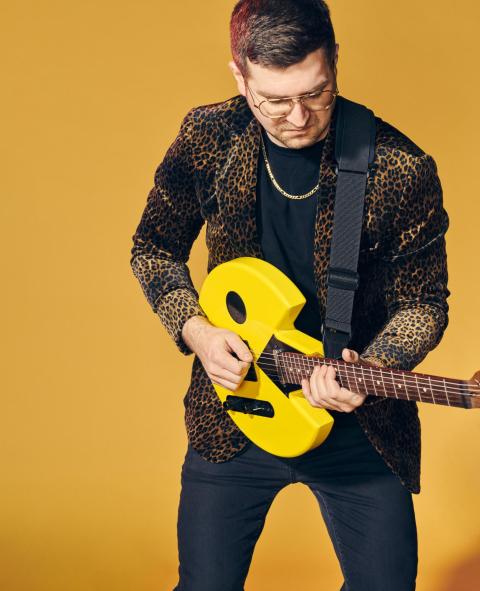
Charlie Rosen '12 was photographed at Power Station at Berklee NYC in April 2024.
Image by Mackenzie Stroh
Charlie Rosen ’12 was just three years old when his parents noted his perfect pitch. Not long after learning his colors, he could say whether a piano sound came from a black key or a white one. His parents, both musicians, started giving him lessons and let him experiment with the assortment of instruments they had around the house, an assemblage that included his mother’s woodwinds and his father’s theremin and backyard pipe organ.
As Rosen’s interest grew, so did the number of instruments in his musical quiver. By the time he left for his first Broadway gig at age 17, he played several dozen. And though he considers himself “instrument fluid,” he identifies primarily as a bassist. It’s the instrument that brought him to Broadway and to Berklee.
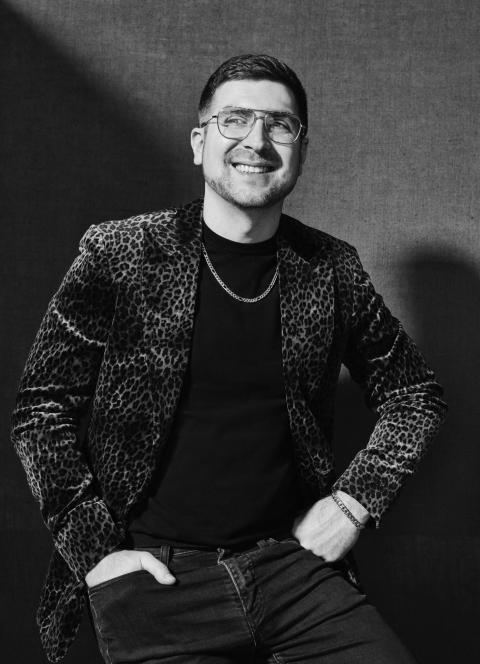
Charlie Rosen
Image by Mackenzie Stroh
During his initial years at both institutions, he toggled back and forth between New York and Boston, discovering the gaps in his knowledge while on the job and filling them at college, where he was pursuing a double major in film scoring and contemporary writing and production.
“One of the semesters I was doing this off-Broadway show while I was enrolled [at Berklee], so I scheduled every single one of my classes on Monday. I would take the Amtrak at two in the morning on Sunday night back to Boston, crash on a couch, and go to class all day, and then get on the Amtrak from South Station back to New York in time to make my show. That was insane. Only when you’re 19 can you do that,” Rosen, now 33, said during a recent interview from his Brooklyn apartment.
The effort, along with tirelessly working shows and gigs and cabarets in New York, is paying off. He’s been nominated for three Tony Awards for orchestration, winning two—in 2020 for Moulin Rouge! and 2023 for Some Like It Hot—and has won two Grammy Awards, in 2024 for Best Musical Theater Album (for Some Like It Hot) and in 2022 for Best Arrangement, Instrumental or A Cappella (for “Meta Knight’s Revenge” with his 8-Bit Big Band).
Not long after his latest Grammy win, Rosen spoke with Berklee Today about the unusual opportunity that led him to Broadway, how he went from being a pit musician to an orchestrator, and how he sees video-game music as a canon ripe for reinterpretation. He also answers a student’s question: What’s the most sustainable job for a musician on Broadway today? What follows is a condensed version of that conversation, edited for clarity.
I was reading a little bit about your history, and you have quite an interesting one. I understand your parents are both musicians. Tell me about your early exposure to music.
I grew up in a really musical household. My mom is primarily a bassoon player but does some woodwind doubling and…would tour with woodwind quintets. And then, at a certain point, she started her career as a music educator. My father is somewhat more of a niche instrumentalist…he’s a silent movie theater organist. So in our house in L.A., in the Valley, we have installed in a separate building in our backyard an 11-rank Wurlitzer pipe organ that we used to screen silent movies there, and he would accompany them on the organ. But he also plays piano and accordion and is a big early jazz fan. And also bluegrass—he plays banjo and some guitar and bass and stuff like that. And so I grew up in a household with tons of just random instruments around all the time.
Your parents were both professional musicians?
My mom, yeah, absolutely was. My dad, as you can imagine, anytime after 1950 being a silent movie theater organist is not a super lucrative job, and so he became a workers’ comp attorney.
What was your first instrument?
I started on piano, and I took piano lessons from my mom at first, and then some other pianists when I was in, you know, single digits.
When did you start branching out and playing different instruments?
When I was maybe 8 or 9 I started taking cello lessons. Maybe 10 or 11 was flute…. Maybe when I was in high school I was playing a lot of sax because my mom had a sax, an alto sax. And also in high school I started playing some brass a little bit, but just messing around. But I was really serious in high school about taking drum lessons, guitar lessons, and bass lessons. Also in high school I got serious about taking piano lessons, like, jazz piano.
I went to high school as a drummer, actually, a jazz drummer. Somewhere in my middle teenage years, I picked up bass. I think it was because…the jazz orchestra [or] some after-school jazz program needed a bass player. So there I was. Now I’m a bass player.
“I just got very, very lucky. This is so unusual. People play all sorts of developments of shows for years. Somehow I picked two winners.”
—
Did you go to a performing arts high school?
I did. I went to a high school called Alexander Hamilton High School. It’s a Los Angeles Unified School District school…but they also have a music magnet within the school that a lot of L.A. musicians have gone to…. But to be in this music magnet you had to audition, and I auditioned as a drummer.... So I was playing drums in my high school, I was playing bass in this after-school program, [and] I was playing guitar in this musical that was being developed which was called 13: The Musical, which is not based on the movie.
And, yeah, I just spent a lot of my early years in high school playing in bands with my friends, and, specifically in Southern California at the time, ska was a big thing. So a lot of horn sections. That’s where I first started writing for horns. And I was writing some big band charts in high school.
How did the opportunity to play for the musical come about?
I was really lucky when I was in high school to do a production of a [Los Angeles Music Center] musical where the gimmick of it was that it was all teenagers in the cast, and also the composer insisted that it’d be all teenagers in the orchestra, which is highly unusual. Incredibly unusual. I don’t think it’s been done since. I don’t think it had been done before that. But right place, right time. And that gig ended up going to Broadway. So I moved to New York when I was 17 to do that—before I even went to Berklee. And so I was living [in New York], gigging as a pit musician. Didn’t know I was going to fall into the world of theater, really, and really just stumbled into it in that way. And I’ve really found a home for myself there ever since.
You lived alone in New York at 17?
Actually, I got into the Berklee five-week program. So the show was starting rehearsals in New York in September of 2008, and I did the five-week program that summer. And then I…moved to New York right after. And then I lived with the guitar player from the show. Me and him lived in an apartment in Midtown.
[13: The Musical] transferred to Broadway the fall of 2008 and then…closed after six months. I went to Berklee and I did one semester. And then, somehow, the other show [I did in high school with the Music Center], Bloody, Bloody Andrew Jackson, also transferred to Broadway the following year. And so I took a pause from Berklee, I did that [show], and I went back [to Berklee]. So I just got very, very lucky. This is so unusual. People play all sorts of developments of shows for years. Somehow I picked two winners, and they both transferred to Broadway within a year of each other, and that was obviously a really strong foothold for me in the world of musical theater.
So you already had a career started in New York when you were an undergrad at Berklee. Was part of you thinking you should stay in New York and pursue your career instead of going to college?
Berklee was very, very understanding about that. …Berklee is so cool about being like, “You go work. We’ll hold your scholarship for a year, you come back.” And what was so good about that was, I had a career in New York, a gig ended, and I said, “Okay, I understand the scene. I know what I need to learn.” [I’d] go back to Berklee, take the classes that I knew I would need to use in this field. Another gig, left, grew more as a professional musician, learned a lot of stuff in the real world and on the job…“Okay, well, this gig’s over, I’m going to go back to Berklee again. But this time I really want to focus on the following skill sets: using music technology to produce demos, arranging in these styles which I’m going to be asked to do….” It was incredibly, incredibly useful.
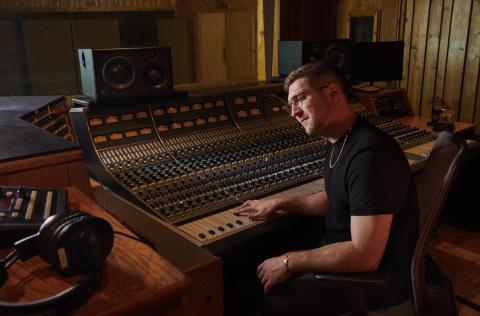
You ended up doing four semesters this way before leaving Berklee, right?
It was bittersweet because, I mean, I loved it at Berklee. …Berklee is a large school, but the thing that’s great about that is it’s a way more accurate microcosm of the music business as a whole, which is massive. Even these sub-scenes, like the theater world, is very big. And so if you want to make something happen, you gotta have the initiative to do it yourself…. At Berklee, [having] so many people can work to your benefit to learn actual, real-world skills about how to find the musicians you need.
How did you apply the skills you learned to Broadway?
People talk about Broadway or musical theater like it’s a genre of music, like, “Oh, I love Broadway music.” And you’re like, well, it’s not actually really a genre. Broadway is any genre. So it requires being a bit of a chameleon of a musician, and understanding many, many different genres and playing styles. And I felt like Berklee was kind of the only place that really was representative of that in the academic music world. For example, I took the South Indian rhythmic solfège class at Berklee. And Afro-Caribbean percussion for the non-percussionist. You know, the groove studies class where you’re picking apart the Motown grooves and Stacks and Muscle Shoals, and talking about the differences in the groove stylings of these heavy recording studios in the mid-century. And that was so, so, so important, especially for work in the theater, when your reference point is [that] they give you another song, and they want it to sound like this. And you’re like, “Great. No problem. I know how that works. That makes perfect sense. I know what these horn parts need to sound like.”
How did you make the transition from being a pit musician to being an orchestrator?
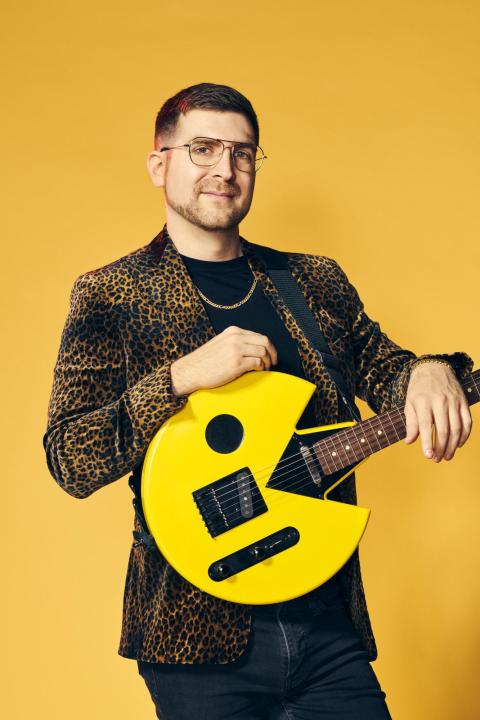
I started playing concerts outside of the show, for cabarets and showcases and people’s concerts at venues around New York like Joe’s Pub and Le Poisson Rouge, and lots of Rockwood [Music Hall] shows. And playing in people’s bands that were sort of affiliated with theater. It first started with me just going, “Hey, listen, what do you need?” Or being on the gig and, to be honest, reading less than exemplary charts. They were wrong, or they looked terrible, or the copy work was bad. And just being like, “Hey, listen, let me fix your charts. I’ll do it for free, whatever. I’ll transcribe your charts. I’ll transcribe your piano parts. I’ll make piano vocal music for you. I’ll write out rhythm section parts for you. I’ll write horn parts for you, whatever you want to do.” And I started doing more and more of that…meeting these writers, asking them if they needed any music preparation stuff. And then they started asking me to help them do arrangements for their albums. …That eventually started rolling into bigger and bigger things: people asking me to do single charts for off-Broadway shows or live concerts. And it sort of just snowballed from there. …And then a club in New York called 54 Below opened. It sort of became theater’s cabaret/nightclub/performing space. …I was there three or four times a week, playing the bass or the guitar as a side musician. I really got to know all the owners. At one point I said to them, “Hey, you know what would be cool? The Village Vanguard, Birdland, the Blue Note, these are these establishment jazz nightclubs and they all have big bands. I’m a big-band writer, and I’ve done a couple of Broadway shows…. Can I be your house big band? Once a month we’ll do a big-band concert. I’ll do all these fresh, reimagined Broadway arrangements. We’ll get Broadway singers to come in front of the band. We’ll shove 17 musicians on a tiny stage. It’ll be great.” And we started doing that, and they loved it. And I did that for eight years.
I invited everybody I could possibly invite. Directors and choreographers and composers of all walks of life: newer, younger, older…any contact I ever made. And that led me to start getting some actual bigger gigs. I got asked to contribute a couple charts, orchestrations, for a Broadway show that was kind of a big-band thing called Honeymoon in Vegas. And I think that’s around the time I met Joe Iconis. So we started working on Be More Chill together. …[54 Below] was an incredible lab for me to work on my craft and try stuff out and see what worked, see what didn’t work, see what was playable, what was unplayable, what was easy, what was difficult, and just learn a ton about arranging. And conducting, because I was conducting it once a month. So that’s the thing that really got me known.
Another thing you’re really known for now is being the leader and creator of the 8-Bit Big Band, which brought you your first Grammy. Can you tell me how this band came about?
I went to Japan for fun [in 2017]. …I asked [a friend there], “Do you have any friends that play shamisen or koto?” And he said, “Yeah, I got a friend in Tokyo.” I went to his apartment, and he gave me a shamisen lesson. …And I noticed that he had a soundtrack for a very obscure video game that I love…I said, “Oh, is that Ganbare Goemon?” He said, “Oh, do you like video game music?” And I thought, “I mean. I’ve never said it out loud, but yeah, I do.” I played a lot of games growing up. I still do. And I really like the music from them, especially Nintendo stuff. He said, “Let me give you a gift.” And he gave me a copy of his album [which] is all video game music arranged for traditional Japanese ensemble.
I was listening to it on the plane, like, “This is so awesome. I love video games…maybe it’d be cool to do an album of my favorite video game music.” So I just did it for fun. …I expected nothing. Turns out, there’s an incredibly robust and very hardcore and dedicated fan base to video game music that is thriving on the internet. I had no idea. …And the response was so strong that it has motivated me. We’re on our fourth album.
The thing that’s great about it now, and sort of has become the point of the band, is…when you talk about canons of music—the Great American Songbook, film scores, Broadway scores, jazz standards, Motown…the Beatles—jazz musicians historically…take from popular canon and we reinterpret it. And so in the same way that Ella Fitzgerald, Frank Sinatra, the Rat Pack singers, Nelson Riddle, Quincy Jones ['51, '83H]—all these mid-century singers and orchestrators and arrangers—were taking from the popular canons…and creating standards from these that jazz musicians could then take those as jumping off points for their own ideas and arrangements. …In the same way, we now have a collection of video game music. …So it’s ready to be reimagined and reinterpreted.
I was looking around the scene, going…“There’s all these big orchestras playing video game [music], but they’re all very classical. They’re very straightlaced. They are one-to-one adaptations. …But there wasn’t anybody doing the things that these mid-century arrangers [did]. They’re adding solos and intros and outros in their own arranging styles. They’re bantering. They’re doing bandleader stuff. They’re doing crowd work. There are solos, featured instrumentalists, featured guests. It’s fun. It’s lighthearted.…There’s no one doing that kind of large ensemble arranging in video game music.” So I just was like, “I’m gonna do that.”
“The most sustainable career for a musician in New York is to not have one career."
—
You’ve also done film and TV scoring. Are those things you’d like to do more of or are you happy in the Broadway world?
They’re both great. And they’re both similar and dissimilar at the same time. Ultimately, whatever you’re writing music for—if you’re writing music for a piece of visual media, if it’s on stage or not—it’s the same skill set of just understanding dramatic music writing and how it can function, and how to serve the story and the lyric, or the text, the dialogue—whatever’s in the foreground. How to not distract and how to enhance.
I was talking to a student on campus recently who’s a big fan. I asked him if he had any questions for you, and he had a couple. The first was, “How does one find work as a pit musician?”
I’m really lucky because I came into it in this kind of backdoor way, where they specifically needed teenagers. …But the normal way is moving to New York, trying to gig as much as possible and going to people’s concerts, meeting people, meeting music directors at these little concerts/cabarets, meeting other musicians, hanging for a long time, being a face people recognize, getting asked to play $50 gigs. The upstart cost is sadly pretty high, because the city is so expensive. …It’s 100 percent network-based. And the gatekeeping is strong. So it’s tough.
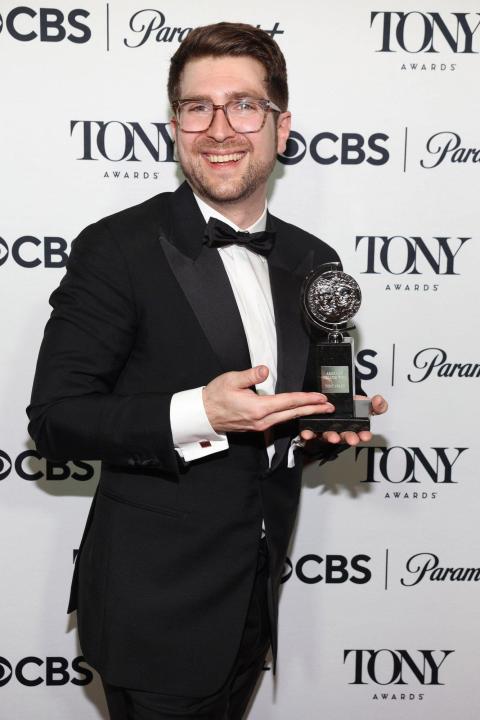
Rosen at the 76th Annual Tony Awardds in New York, June 2023
Manoli Figetakis/Everett Collection/Alamy Live New
The student’s second question was, “What’s the most sustainable career for a musician on Broadway?”
The most sustainable career for a musician in New York is to not have one career. The only way I’ve been able to survive is to be able to play, to be able to orchestrate in a traditional sense—that is, put sheet music directly into notation software and have it come out and be read by instruments and be good—[and] being able to program tracks and synthesizers. Do my own keyboard programming. Do my own track production click work, you know, generating click tracks. Working on the technology side of the music. Being able to do it all myself meant that in the early part of my career, when I could be either working or not, I did shows where I was just programming Ableton. …I just had to kind of do it all before I got well known enough at one particular thing that that [thing] became sustainable. But the most sustainable thing you can do is not just do one thing.
And even a more micro sense, like, if you play the sax, you better play every woodwind. Cast as wide of a net as you can. …Do as much as you can, because you just never know. And there’s always gonna be this one thing where it’ll be like, “Oh, man, do you know anybody for this gig that can play the guitar, sing, trigger Ableton, and play keyboard 3?” ...So the only way to really make a sustainable career is to just be a Swiss Army knife, because none of them on their own are sustainable. …[You] gotta go like this [zigzags hand back and forth] and then eventually you get to a sustainable job, but it takes a long time; you have to go through about 10 or 15 years of unsustainability before you get there.
Are you there?
I might finally be getting there. But I don’t have health care, for example. I didn’t do enough union work in the last six months to have health care through the union. So does that count as sustainable? I don’t know.
Have more calls been coming in since you got the Tonys and Grammys?
Yes and no. I don’t know if the quantity of calls coming in has changed quite yet. But the quality of the negotiations has gone up.
